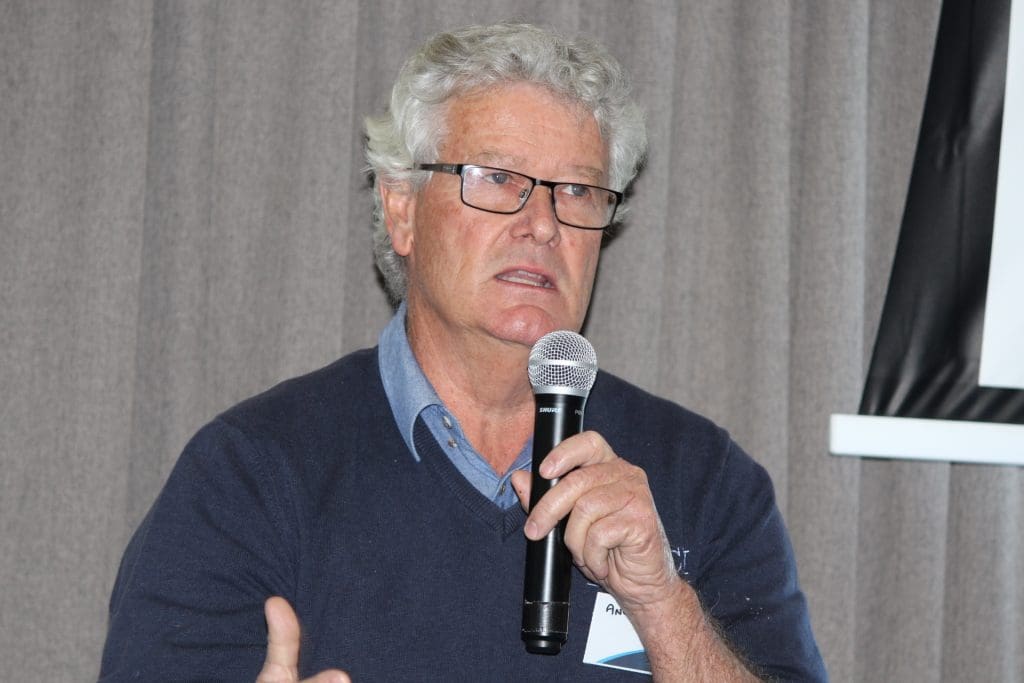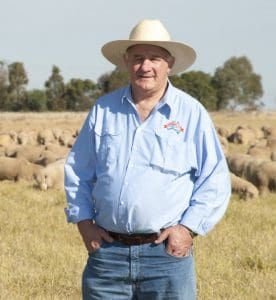
Sheep breeder and MLA board member Andrew Michael.
PEAK body Sheep Producers Australia and major meat exporter Roger Fletcher have come out against a suggestion to add animal welfare treatment declarations to the National Vendor Declaration.
South Australian sheep meat and wool producer Andrew Michael wants improved transparency and traceability systems implemented and supports producers being able to declare the mulesing and pain relief status of sheep and lambs on the National Vendor Declaration.
However, despite receiving producer support for the proposed NVD changes, he is meeting opposition within industry organisations.
“I can’t work out where the pushback is coming from.”
Mr Michael is also a Meat & Livestock Australia director, but he has spoken to sheep producers using pain relief and not mulesing that want justification and recognition for the work they’ve done.
“They want to be in a position where they are not going to lose market share because of a lack of industry transparency and traceability, driven by the industry.”
Mr Michael said as an MLA director he has made industry representatives aware of his concerns around the Australian sheep meat industry’s lack of traceability.
The European Union is considering changing laws to either prohibit tail docking and castration or mandating pain relief for the procedures domestically, and considering imports within this context. Mr Michael is concerned that future trade deals with the EU and the UK could be compromised by the differing animal welfare standards and traceability systems between the countries and those in Australia.
“One day it will happen, we will lose market share, and that’s my concern.”
Mr Michael believes that as a director of (MLA’s) Integrity Systems Company, he has a responsibility to voice his concerns about sheep meat industry traceability.
“I am not suggesting that we stop mulesing or mandate pain relief, but we have to have traceability so we can at least satisfy markets as they come forward, the same as what has happened in the wool industry.
“I now look at the wool industry and the differences in price (between mulesed and non-mulesed wool) and our customers are able to demand non-mulesed wool because of traceability and transparency,” Mr Michael said.
He believes the sheep meat industry should collaborate with the wool sector in making its products similarly certified or accredited according to animal welfare treatment status.
Mr Michael believes there is a need on overseas sheep meat markets for traceability and transparency around mulesing and pain relief, and this could be provided by the National Vendor Declaration, rather than through the sheep health statement, because the NVD is required nationally for all sheep/lamb sales and movements.
“This would be consistent with what the National Wool Declaration provides for the wool industry.”
Mr Michael rejects the argument that the NVD is only a food safety and biosecurity document, quoting the Integrity Systems website that says the NVD “communicates the food safety and treatment status of every animal every time it moves along the value chain – between properties, to saleyards, or to processors. The NVD also acts as movement documentation throughout the value chain.”
In a comment on Sheep Central, he said: “Open, honest and transparent traceability is very important if our sheep industry is going to progress with free trade agreements with our trading partners.”
NVD should remain a food safety document – Sheep Producers Australia
Sheep Producers Australia acting chief executive officer Bonnie Skinner said defending and improving access to global markets is crucial to ensure the prosperity of the Australian lamb and sheep meat industry, underpinned by robust traceability and food safety systems.
“SPA is committed to continual improvement of our integrity systems to ensure we are addressing the needs of international customers who want to understand more about how their food is produced.
“While some producers have indicated to SPA that they would like to build on Australia’s world leading quality assurance programs by having a way to declare and promote the welfare credentials of their livestock as they move through the supply chain, SPA’s current view is that the NVD is a food safety certification document, and should remain as such to maintain the integrity of that document,” she said.
“SPA is seeking further research to qualify market demands associated with sheep husbandry practices, with the aim of better understanding the drivers for the collection of this information and the ideal mechanism by which to both collect and verify the data.
“Further discussion could be had as to whether existing national systems such as the Livestock Production Assurance program could be expanded to include auditing and verification of these types of practices,” she said.
“Currently, declaration and auditing of these types of practices would be commercial decisions managed through arrangements between companies and their customers.”
Exporter Roger Fletcher agrees with SPA

Sheep meat exporter Roger Fletcher
Australia’s leading sheep meat exporter into the United Kingdom and the European Union, Roger Fletcher, said there is no need to add extra declarations to the National Vendor Declaration.
He believes putting animal welfare declarations on the NVD would be “playing to the minority.”
“All it would be doing is making more work for everyone – everything comes at a cost.
“At this stage, you would be just pushing more and more stuff onto people.”
Mr Fletcher said it would be difficult for abattoirs to split lambs and mutton according to their animal welfare treatment status, although he recognised some overseas orders demanded non-mulesed lambs.
He said he is not seeing any of his EU or UK customers demanding additional animal welfare requirements “at this stage.”
“Leave it to those who are marketing the meat.”
Mr Fletcher recognised that some overseas customers required sheep meat product with specific animal welfare treatment criteria, “but to put it right across the industry is a joke.”
The peak industry councils control the NVD
At the Merinolink conference in June this year, MLA managing director Jason Strong said the NVD wasn’t necessarily the best “mechanism” through which to make mulesing and pain relief treatment declarations for sheep and lamb sales. He indicated it would be difficult to get industry representative policy to support this, but that the “greater opportunity” lay with adding a file with this option into an eNVD that travels with animals through the supply chain.
Mr Michael also recognised that with the number of industry bodies involved, it is hard to implement changes to the NVD, which are considered every two years by the Jurisdictional Traceability Group for endorsement by SAFEMEAT.
SAFEMEAT is in the process of reviewing a current list of changes to the NVD which are likely to be considered for endorsement in June 2022, but Mr Michael is not aware that any animal welfare declaration changes are up for consideration.

Integrity Systems Company CEO Dr Jane Weatherley.
ISC chief executive officer Jane Weatherley told Sheep Central the eNVD has the ability to be updated at minimal cost; “however we can’t just make changes; it needs to go through a consultation and endorsement processes.
“Changes to the NVD/eNVD are implemented in two-year cycles to minimise disruption to industry.
“We await industry representative policy to support changes to the NVD on mulesing and use of pain relief,” Dr Weatherley said.
“MLA will support the implementation on a traceability system for mulesing and use of pain relief if industry representative policy has been developed.
“It isn’t MLA’s role to seek industry support to add mulesing and pain relief declarations to the NVD — that is the role of peak industry councils,” she said.

I agree with the issues raised by Mr. Michael about improving traceability, especially sending sheep meat products into the EU.
Their standards of animal welfare required in the management of livestock are far higher than we have here and if we had to abide by their standards many red meat producers would leave the industry.
One only has to see what is happening in the wool industry with the large premiums now being paid for RWS wool, and although it is about non-mulesed wool, it’s now more about traceability.
Just imagine the success the producer could have in the red meat industry if there was a similar auditing system, so that we could then expand the red meat market in the EU because those consumers know that they are buying product that is grown under the same conditions to what their own producers are working under?
Most UK abattoirs won’t accept sheep/lambs unless they are accompanied by an animal welfare certificate. We need to be on the front foot and capture these markets.
Our state farmer organisations and associated industy councils need to be working for all farmers. There needs to be a road map/system to identify these products through the production chain. It should not be left for exporters to capture profits from farmers’ good animal welfare outcomes.